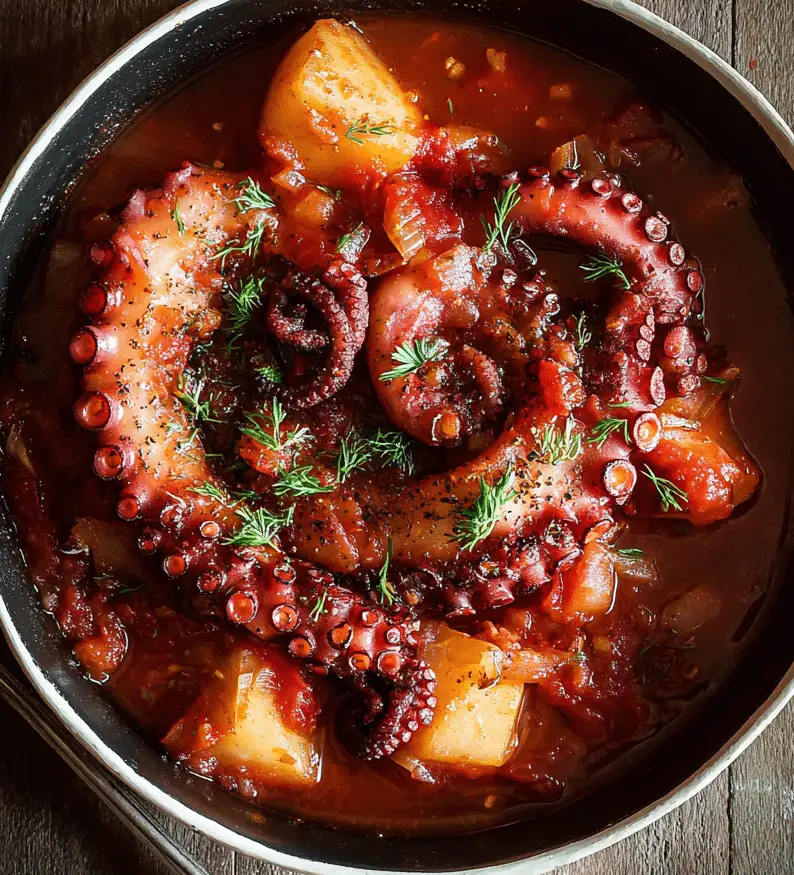The Greek Octopus Stew, or “Ktapodaki Kokkinisto,” is a treasured dish in Greek coastal cuisine. With tender octopus simmered slowly in a luscious tomato and red wine sauce, it brings together bold Mediterranean flavors in a comforting, hearty format. This dish is often enjoyed as a main course with crusty bread, pasta, or even rice, soaking up every drop of that rich, savory sauce.
Octopus is a staple in Greek islands, frequently served during fasting periods or festive seafood feasts. What makes this stew special is its simplicity: minimal ingredients, maximum flavor. It’s a true example of Greek home cooking at its finest—elegant, slow-cooked, and steeped in tradition.
Full Recipe
Ingredients:
-
1 large octopus (about 1.2 kg), cleaned and rinsed
-
1/3 cup extra virgin olive oil
-
1 large onion, finely chopped
-
2 garlic cloves, minced
-
1/2 cup dry red wine
-
400g crushed tomatoes (or grated fresh tomatoes)
-
2 tablespoons tomato paste
-
1 bay leaf
-
1/2 teaspoon whole black peppercorns
-
Salt to taste
-
Water, as needed
Directions:
-
Cut the octopus into medium-sized chunks.
-
In a large pot or Dutch oven, heat olive oil over medium heat and sauté the onion and garlic until soft and aromatic.
-
Add the octopus pieces and cook for 10 minutes, allowing them to release their juices.
-
Pour in the red wine and cook for another 5 minutes to reduce slightly.
-
Stir in the tomato paste and crushed tomatoes. Add the bay leaf, peppercorns, and a little salt.
-
Cover the pot and simmer gently over low heat for 1.5 to 2 hours, or until the octopus is tender. Add a bit of water during cooking if needed.
-
Adjust seasoning and remove the bay leaf before serving.
Prep Time: 15 minutes | Cooking Time: 1 hour 45 minutes | Total Time: 2 hours
Kcal: 290 kcal | Servings: 4 servings
The Rich Tradition Behind Greek Octopus Stew
Greek Octopus Stew, or Ktapodaki Kokkinisto, is a beloved dish rooted deeply in the culinary traditions of Greece, especially prevalent in the islands and coastal regions. Celebrated for its unique blend of land and sea elements, this stew is a testament to Greece’s historical connection to the Mediterranean. While seafood dishes can be light and fresh, this particular recipe embraces depth, warmth, and richness—thanks to its slow-cooked tomato and red wine base. This fusion of tender octopus with earthy and savory components makes it an unforgettable Greek classic.
A Glimpse into Greek Coastal Cuisine
Greek cuisine is fundamentally Mediterranean, characterized by the use of olive oil, fresh herbs, vegetables, legumes, and of course, seafood. Among the most distinguished ingredients in coastal Greek dishes is octopus—readily available, protein-rich, and surprisingly versatile. The Greek Octopus Stew reflects not just the geography of Greece but also its culinary ethos of using simple, wholesome ingredients to create soul-satisfying meals. It’s not just a dish—it’s an experience steeped in heritage, usually passed down through generations in handwritten family cookbooks.
Why Octopus?
Octopus has been a staple in the Greek diet since ancient times. Known for its chewy texture and subtle, slightly sweet flavor, octopus becomes incredibly tender when slow-cooked properly, making it the perfect star for a stew. In the past, Greek fishermen would tenderize octopus by hitting it against rocks before drying it under the sun. These traditional methods are still used in some villages today, a testament to how this creature from the sea continues to hold a special place on the Greek table. Its adaptability with Mediterranean seasonings, especially tomato and wine, gives it a unique edge that elevates any dish it graces.
The Depth of Flavor from Tomato and Red Wine
What sets Greek Octopus Stew apart from other seafood dishes is its distinctive tomato and red wine sauce. Tomatoes offer acidity and sweetness, perfectly balancing the briny notes of the octopus. When combined with red wine, the sauce transforms into a deep, complex broth that complements the meatiness of the octopus. Herbs such as bay leaf, peppercorns, and garlic build a robust aroma that fills the kitchen with rustic warmth. The slow simmering process allows every component to marry harmoniously, producing a thick, flavorful sauce that coats each piece of octopus like a velvet robe.
A Dish for All Seasons
Though it’s warm and hearty, Greek Octopus Stew is not restricted to colder months. On the islands, it’s common to see locals enjoying it year-round, often served alongside crusty bread, pasta, or rice. During religious fasting periods, especially Lent, this dish takes center stage as a meat-free option that still feels indulgent and satisfying. Because it doesn’t rely on dairy or heavy creams, it’s both dairy-free and suitable for pescatarians, making it adaptable for many dietary preferences.
How Greek Octopus Stew Is Served
This dish is extremely versatile in its serving potential. On special occasions, it might be plated elegantly as a main course with a side of orzo or creamy mashed potatoes. In more casual settings, it’s served as part of a family-style spread with olives, feta cheese, and fresh village bread. Often, a squeeze of lemon juice is added just before serving to brighten the flavors. Paired with a glass of Greek red wine or retsina, this stew becomes not just a meal, but a cultural celebration.
Nutritional Value and Health Benefits
Octopus is a lean protein, low in fat, and rich in essential nutrients like vitamin B12, iron, selenium, and omega-3 fatty acids. When cooked without excessive oils or processed ingredients—as in this traditional stew—it becomes a nutritious option for those looking to maintain a healthy Mediterranean diet. The use of tomatoes boosts the dish’s vitamin C and lycopene content, while the olive oil adds heart-healthy monounsaturated fats. In short, this is a guilt-free indulgence that aligns beautifully with balanced eating.
Cooking Tips and Techniques
Preparing octopus may seem intimidating to those unfamiliar with it, but it’s simpler than it appears. The key to a tender outcome is patience. Unlike many meats that toughen with long cooking, octopus becomes more tender the longer it simmers. Using a heavy-bottomed pot or Dutch oven ensures even cooking and prevents the stew from burning. Although some cooks recommend boiling the octopus beforehand, this step isn’t necessary when making this stew, as the long cooking time in the tomato-wine sauce achieves the same, if not better, results.
A Celebration of Simplicity and Flavor
Greek Octopus Stew embodies the Greek philosophy of food: simple ingredients, thoughtfully prepared. It doesn’t require expensive components or overly complex techniques. Instead, it thrives on fresh, quality ingredients and the slow art of layering flavor. Whether made in a humble seaside cottage or a modern kitchen, this dish holds onto its rustic charm and ancient roots, bringing a touch of Greece to every bite.
Cultural Relevance and Festive Occasions
In Greece, food is often tied to religious and cultural events. Octopus Stew makes frequent appearances during fasting periods like Easter Lent, where meat is avoided but seafood is embraced. It’s also a beloved dish during name days, birthdays, or any gathering that calls for a shared meal with family. The act of preparing and enjoying this stew is often communal—someone stirring the pot, another slicing bread, and a bottle of wine being passed around. It represents not just nourishment, but a moment of togetherness.
Conclusion: A Classic Dish Worth Revisiting
Greek Octopus Stew is more than a recipe—it’s a window into Greece’s soul. It represents the harmony of sea and land, simplicity and depth, tradition and adaptability. Whether you’re exploring Mediterranean cuisine for the first time or are a seasoned home cook looking to try something new, this dish offers a rewarding culinary journey. From the tender octopus to the savory sauce, each spoonful tells a story of sun-soaked coastlines, family gatherings, and age-old traditions passed from one generation to the next. It’s a dish that comforts, surprises, and transports you—all at once.
If you’re curating content for your food blog or creating a rich, authentic section in a cookbook, Greek Octopus Stew is a must-include. Its historical background, health benefits, and cultural importance make it not only a delicious recipe but also a meaningful one that resonates with food lovers around the world.






